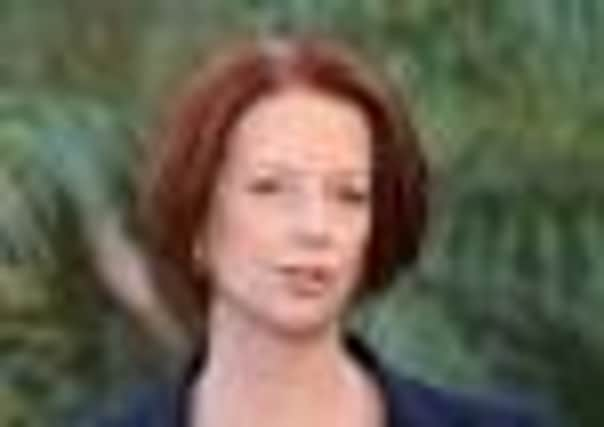Julia Gillard stamps authority on party with gamble


Ms Gillard stamped her authority on the governing Labour Party yesterday through being re-elected unopposed after Mr Rudd conceded he did not have enough support to topple her. Treasurer Wayne Swan was re-elected unopposed as deputy premier.
The move to call a leadership vote came after months of infighting, with Mr Rudd’s supporters pushing for a change to help revive Labour’s ailing fortunes in the polls.
Advertisement
Hide AdAdvertisement
Hide Ad“Today, the leadership of the Labour Party has been settled and settled in the most conclusive fashion possible,” Ms Gillard told reporters. “The whole business is completely at an end.”
Labour has now endorsed Ms Gillard over Mr Rudd in three leadership votes. But she faces the prospect of trying to unify a deeply divided party and turning around polls which show her government could be easily defeated in the general election.
“I think they’re terminal. There is no way out of this,” political analyst Nick Economou said, adding the leadership tension reinforced perceptions that the conservative opposition would romp home.
Ms Gillard’s leadership has been under threat for most of the past two years as her minority government lumbered from one crisis to another, despite a booming economy, which avoided recession after the 2008 global crisis and which has seen 21 years of continuous growth.
Ms Gillard, Australia’s first female prime minister, replaced Mr Rudd in a party coup in June 2010. The dumping of Mr Rudd, an elected PM, angered many voters who have never forgiven Ms Gillard for his ousting.
She defeated Mr Rudd a second time in a leadership vote in February 2012, prompting him to promise that he would not challenge and would only take on the leadership with the overwhelming support of his party.
Yesterday, he conceded he did not have the numbers to win against Ms Gillard. “I said that the only circumstances under which I would consider a return to the leadership would be if there was an overwhelming majority of the parliamentary party requesting such a return – drafting me to return. And the position was vacant,” Mr Rudd said ahead of the vote. “I am here to inform you that those circumstances do not exist.”
Ms Gillard has consistently failed to arrest a slump in the polls, which predict a major defeat in September with Labour losing about 20 seats in the 150-seat parliament.
Advertisement
Hide AdAdvertisement
Hide AdAustralia’s largely conservative voters never really warmed to Ms Gillard, the plain-spoken daughter of Welsh migrants, and discontent has deepened despite her ability to negotiate deals with Greens and independents on complex policies.
But voters remain angry that she went into the 2010 election promising to never introduce a carbon tax, only to renege and introduce the tax in order to secure support from the Greens.
She almost lost the 2010 election, winning fewer votes and fewer seats than the conservative opposition, but she held on to power by forging agreements with three independents and the Greens.
Her public support wasn’t helped by the fact she is not married and has no children and says she does not believe in God, in a country where politicians generally need to appeal to “family values”.
Her rule has also been marked by a series of scandals. One MP was forced out of the party over allegations he spent union money on prostitutes, which he denied.
Her choice of parliamentary speaker was forced out over sexual harassment claims, which were later dismissed.
There is little difference in economic policies between the government and opposition. But Liberal party opposition leader Tony Abbott has promised to scrap a 30 per cent tax on coal and iron-ore mine profits, and to scrap the carbon tax if he wins power.